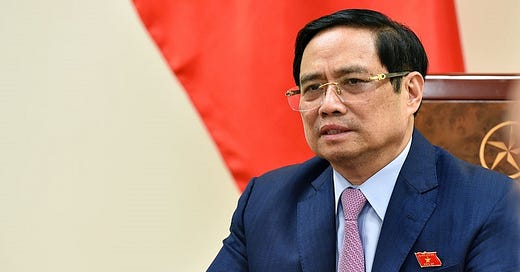By: David Brown
Prime Minister Phạm Minh Chính will lead a pack of senior Vietnamese officials to Washington next week. Before they participate in President Joe Biden's May 12-13 “Special Asian Summit”, the knock-on consequences of Russia's invasion of Ukraine will very likely dominate bilateral consultations with American counterparts.
Putin's war has shaken a fundamental assumption of Vietnam's defense posture: that Russia would remain a reliable supplier of weapons systems it needs to deter Chinese aggression. It has done grave damage to what was a mutually convenient Russian relationship with Vietnam.
That is a tie that dates from Soviet-era aid to the Hanoi communist regime when it fought to secure Vietnam's independence and then to unify the country under Communist rule. Russia is still honored in Hanoi as the orchestrator of generous economic aid during the postwar decade when Vietnam struggled to build a Soviet-style command economy. Now fast forward a few decades: after successfully rebranding Vietnam's economy as "market-Socialist" but wary of Chinese ambitions, the nation's leaders chose to rely on Moscow for relatively inexpensive high-tech weapons systems, including frigates, fighter-bombers, attack submarines, and coastal defense missiles.
Xi Jinping's "China dream" has been Vietnam's nightmare, a threat that Hanoi has managed by building deterrent capability, practicing deference, and emphasizing mutual economic interest. It's an ancient strategy that has proven effective when China acts grandiose, and a set of policies that has enabled modern Vietnam to sustain a modestly constructive relationship with its giant neighbor.
Now, however, Hanoi's no longer assured of having in hand a suite of weapons systems built in Russia. For the foreseeable future, it will be almost impossible for Vietnam to buy arms from Moscow without triggering so-called 'secondary sanctions.' Hanoi seems to have figured that out. Chính reportedly agreed on April 30 with Fumio Kishida, Japan's new prime minister, that "in any region, changing the status quo by means of force is quite intolerable."
Chính and his colleagues must tread very carefully in Washington. Attention there is riveted on the Ukraine crisis. Many who are directing the proxy confrontation with Russia lack a nuanced appreciation of America's Asia-Pacific interests. In support of Ukraine, Vietnam (though for its own good reasons) has been out of step with the rest of America's friends, and that does not sit well with the Eurocentrists in the US foreign policy establishment.
The Vietnamese prime minister's very presence in Washington may prompt negative comment. Aggressive interlocutors may ask why the US shouldn't sanction Hanoi's purchases of Russian weapons systems and decry Hanoi's failure to join UN votes condemning Putin's war.
Chinh is considered a very possible successor to his patron, Nguyễn Phú Trọng whenever the 78-year-old Communist Party chief decides to retire or, just as likely, another stroke renders it impossible for Trọng to stay on the job. The meetings in Washington are Chinh's biggest foreign affairs test so far; his colleagues and rivals will be watching attentively.
'Treading carefully' is not the same as saying nothing. Chính would be wise to manifest genuine sympathy with Ukraine and dismay that Russia, historically a reliable friend to the Hanoi regime, has gone “off the rails.” He should frankly and ruefully confirm that Vietnam has relied on weapons systems bought from Moscow to defend its interests against reckless elements in Beijing. He might say that's a problem he hopes the US can help solve.
The Biden administration prides itself on "pragmatic realism," but American interlocutors seem obsessed by Vietnam's longstanding pretense of being unaligned. Notwithstanding extensive and growing de facto bilateral cooperation aimed at blunting Beijing's ambitions in the South China Sea, they've pressed Hanoi to upgrade its description of its bilateral tie with the US. The relationship ought to be 'strategic,' they say, not just 'comprehensive.'
Assuming that Vietnam's Politburo has processed the implications of Putin's war on Ukraine, a joint proclamation that Vietnam and the US are henceforth 'strategic partners' should be an easy give for Hanoi.
It's a fair bet that President Biden and other interlocutors will urge Vietnam to cease procuring weapons supplied and serviced by Russia. In reply, Chính could point out the obvious: if Washington wants to wean Hanoi off Russian weaponry, it should help Vietnam to find and finance workarounds that strengthen its capacity to defend, like Ukraine, its own territory and sovereignty.
India, too, is considerably dependent on weapons systems purchased from Russia. Perhaps the US could foster tripartite cooperation to meet maintenance needs and help both Vietnam and India to identify and overcome defense procurement challenges going forward.
If Washington and Hanoi agree to call their relationship strategic as well as comprehensive, it is incumbent on both to act accordingly in all spheres. Vietnam remains one of 11 nations that the US designates as a ''non-market economy." That label was true a quarter-century ago but now it's absurd; Vietnam should be delisted.
On Vietnam's part, there's a trade complaint that it ought to investigate urgently, about solar panels allegedly made in China and then, after a bit of polishing in Vietnam or other parts of Southeast Asia, exported to the US. If true -- and it's apparently somewhat true -- nations that have allowed that sort of collusion risk heavy sanctions. Here again Chính should be ready with the facts. If indeed Vietnamese exporters have been among those laundering Chinese-made panel components, Vietnam should shut them down fast.
Chính online: The Center for Strategic and International Studies (CSIS), a Washington think tank, will host the Vietnamese Prime Minister in a live 90-minute webcast on Wednesday, May 11, i.e., after his bilateral consultations and just before the US-ASEAN meeting. The webcast will start at 3 pm Washington time and is billed as a "moderated conversation."
David Brown, a retired US diplomat, is a longtime contributor to Asia Sentinel.



